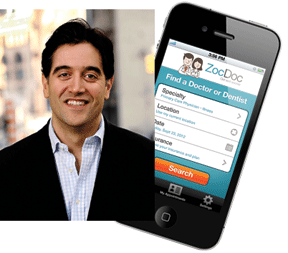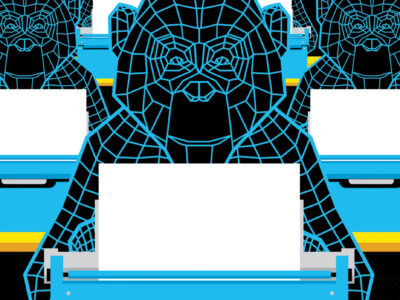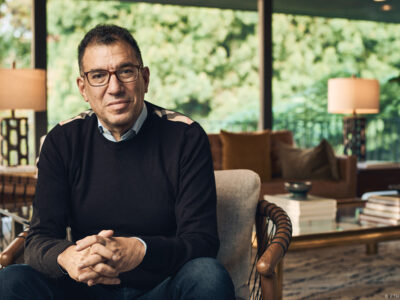
Class of ’98 | Five years ago Cyrus Massoumi W’98 suffered a ruptured eardrum while flying from Seattle to New York.
Once in his Manhattan hotel, he pulled up his insurance company’s website and called one doctor after another, hoping someone could squeeze him in for an emergency appointment. But most of the offices he called didn’t have any appointments available; some didn’t accept his insurance; more than a few turned out to be wrong numbers; and one doctor listed was actually deceased. The earliest appointment he could get was four days out—a long time when your ear is screaming at you.
Massoumi was not just in pain; he was baffled. If he could book the next available flight or the first open restaurant reservation with the click of a button, why was it so hard to get a doctor’s appointment? After mulling it over for a few weeks, he decided he had to take things into his own hands—and ZocDoc was born.
ZocDoc (zocdoc.com) is a website that helps users quickly find and book medical appointments online. The service is free for patients, and they can narrow their search by region and insurance coverage. And since bookings and cancellations are updated online in real time, one patient’s last-minute cancellation can become another’s emergency appointment.
Now, four-and-a-half years after Massoumi had his epiphany, ZocDoc has attracted 1.2 million users and over $95 million from investors, one of whom is Amazon.com founder Jeff Bezos.
But things didn’t look so rosy back in 2007, when Massoumi left his high-paying job at McKinsey and bet all his savings on the success of his start-up. Armed with a PowerPoint presentation, he says, “I checked my pride at the door and went doctor to doctor.”
It wasn’t always an easy sell. Three of those physicians had him escorted out by security. But Massoumi persisted. He got two of his friends, Oliver Kharraz and Nick Ganju, excited about the idea as well, and the trio began working out of Ganju’s apartment. In a matter of months they were nearly ready to launch the website, and were asked to present their product at the 2007 TechCrunch 40 conference, where 40 up-and-coming startups from around the world got a chance to impress investors and win $50,000.
But they faced a lot of skepticism—one venture capitalist went as far as to say that the whole idea was “just sort of too facetious.” A curious choice of words, but indicative of the prevailing attitude. They didn’t win the 50 grand. But Massoumi was undeterred.
“[Zocdoc] solves a huge need, in my opinion,” he says. “When you need a doctor, it’s one of those basic human needs”—and there was no corresponding mechanism to fill that need.
“People in Massachusetts wait sometimes 50 days to see a doctor,” he says, referencing a national study done by healthcare consultants Merritt Hawkins in 2010.
Another kink in the system, which he discovered that time he ruptured his eardrum, was that insurance companies weren’t keeping their records up to date. Massoumi found that 20 to 40 percent of the information on insurance sites was inaccurate. ZocDoc now has a team of employees that makes sure all the information on the website is current and accurate.
Not long ago, Massoumi was able to test-drive ZocDoc himself when he had another airline-related mishap.
“I injured my knee while pulling a suitcase off the conveyor belt,” he says. “It was 2 a.m.” He pulled up ZocDoc on his smart phone, and booked an appointment for 9 a.m. “So I was able to solve my own problem as an accident-prone traveler,” he laughs.
The Web service is free for patients, but doctors pay a monthly subscription fee of $250. And, Massoumi says, as much as patients love the convenience of ZocDoc, doctors like it even better.
“We help doctors increase their overall [time] utilization,” Massoumi says. When one patient cancels, another is immediately able to access and book the empty slot on ZocDoc, which works with each doctor’s office to synchronize its existing calendar system with ZocDoc’s system.
“There’s an interesting trend going on in the US,” he says. “The [Affordable Care Act] created 30 million new patients”—but it didn’t create any more doctors. Services like ZocDoc can help bridge the gap by allowing doctors to see more patients.
Earlier this year, with his company steadily expanding, adding new specialties and cities, Massoumi was invited back to TechCrunch. This time he was asked to discuss ZocDoc’s success.
Even a ruptured eardrum, it seems, can have a silver lining.
—Maanvi Singh C’13




